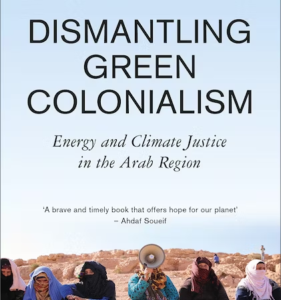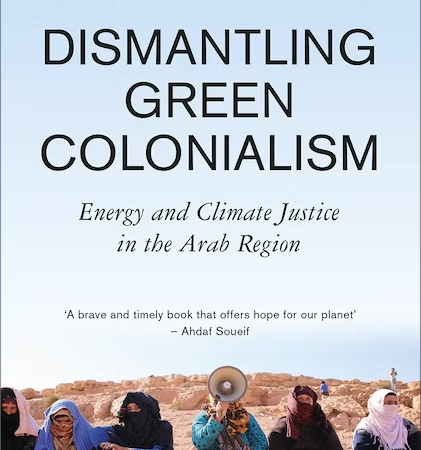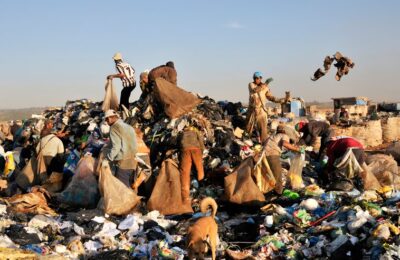From Labour Hub
Mike Phipps reviews Dismantling Green Colonialism: Energy and Climate Justice in the Arab Region, edited by Hamza Hamouchene and Katie Sandwell, published by Pluto.

“The reality of climate breakdown is already visible in the Arab region,” argue editors Hamza Hamouchene and Katie Sandwell in the Introduction of this important book. Iraq was hit in 2022 by sandstorms that shut down much of the country, with thousands of people admitted to hospital because of respiratory problems. Algeria was struck by unprecedented and devastating wildfires. Kuwait experienced a suffocating heat wave, registering well over 50ºC. The United Arab Emirates, Yemen, Oman, Syria, Iraq and Egypt all experienced devastating floods, while southern Morocco struggled with terrible droughts for the third year in a row. The Intergovernmental Panel on Climate Change projects that In the years ahead the Mediterranean and Gulf regions will see an intensification of extreme weather events.
The impacts of these changes are felt disproportionately by marginalized people, small-scale farmers especially. North Africa, where over half the population live in rural areas and are dependent on precarious small-scale agriculture, is particularly affected. Yet as Saker El Nour points out in a chapter here, the region is responsible for the world’s smallest percentage of greenhouse gas emissions – Morocco, for example, accounts for just 0.2%.
The calamitous impacts described above result from global capitalism’s decision to continue burning fossil fuels. As last year’s much-lobbied recent COP 28 underlined, “the same greedy and authoritarian power structures that have contributed to climate change are now shaping the response to it.” While most major international actors pay lip-service to the principle of a climate transition, their commitment to privatisation of water, land, resources and energy threatens to reproduce the same patterns of dispossession and resource plunder.
“What would a just response to climate change look like here?” ask the authors. Would it include the freedom to move across borders, the payment of climate debt by Western governments, multinational corporations, and the rich local elites nationally and regionally? What should happen to the region’s fossil fuel resources that are currently being extracted by national companies and foreign corporations? Who should control and own the region’s renewable energy? Who are the key agents and actors that will fight for meaningful change and radical transformation?
Just transition proposals being advanced by progressive social movements are driven by a conviction that the people who bear the heaviest costs of the current system should not be the ones who pay the costs of a transition to a sustainable society, and at the same time, should be the leading actors in shaping such a transition. “Yet the analyses put forward by the main international institutions do not include questions of class, race, gender, justice, power or colonial history.”
This book, a rare collection of contributions from critical North African and Middle Eastern researchers, seeks to remedy that. A chapter by Hamza Hamouchene identifies several examples from the North African region of how extractivist practices are reproduced even in transitions to renewable energy, in what can be described as “green colonialism”. These include the dispossession of indigenous communities from their land, for example Morocco’s Ouarzazate solar power plant, which displaced local people without their consent and diverts valuable water to maintain its systems.
As Karen Rignall points out, the installation used colonial laws to expropriate communal land. Local protests have highlighted the similarities between the economic, ecological and political impact of this supposedly ‘green project’ and traditional patterns of extractivism. Other projects, such as that at Noor Midelt, operated by the French company EDF Renewables, have raised similar concerns.
The Moroccan regime also uses its development of renewable energy in Western Sahara to ’greenwash’ its occupation of the territory and to conceal the huge environmental footprint of its military deployment and exploitation of phosphates in the country, as Joanna Allan, Hamza Lakhal and Mahmoud Lemaadel point out. A similar ‘eco-normalization’ of Israel’s occupation of Palestine is also taking place, argues Manal Shqair.
The role of international finance institutions in maintaining a colonial approach to energy production and consumption is also scrutinised. Mohamed Gad looks at how the commodification of electricity in Egypt, strongly pushed for by the World Bank, hit the living standards of the country’s poorest, despite a supposed commitment to not do so.
It’s a similar story elsewhere. As Asmaa Mohammad Amin explains, the Jordanian energy sector was part-privatized in 2007 as a condition for loans the government received from the IMF and the World Bank. Consumer subsidies were cut, making it unaffordable to many.
Renewable electricity production in Tunisia has also been liberalised, provoking trade union opposition and demands for the re-municipalization of services, as Chafik Ben Rouine and Flavie Roche report.
Morocco, whose energy sector is governed largely by autocratic instruments, with strategic decisions made beyond democratic control, has also seen resistance. Jawad Moustakbal explains how In 2018, local citizens ran an unprecedented boycott campaign against three companies whose owners were known to be closely linked to the country’s royal family. An official investigation found that the so-called liberalization of the sector had produced oligopolistic malpractices, rather than furthering genuine competition. “Both as taxpayers and as consumers, the population bears the financial consequences of a system that is designed to be totally inequitable and of benefit exclusively private investors.”
It’s a bit specialised, but this book is an antidote to the Eurocentrism of much literature on the subject and an important contribution to what a just transition might look like in the Global South.



